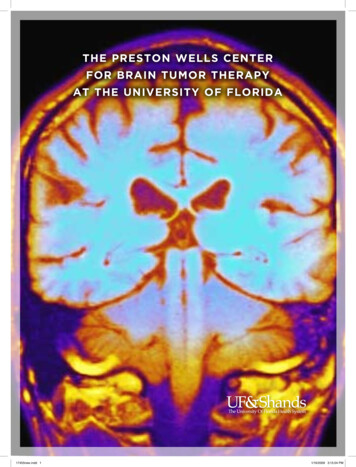
Transcription
THE PRESTON WELLS CENTERFOR BRAIN TUMOR THERAPYAT THE University of Florida17455new.indd 11/16/2009 3:15:04 PM
Introduction: TheProblem and Mission“You have a brain tumor” – that’s a devastating statementfor many patients and their families. Malignant braintumors are one of the most virulent forms of cancer. Theycan result in profound physical and cognitive impairments.Since the brain is the center of thought, personality andemotion, brain tumors are often described as cancer ofquickly makes treatment with surgery or radiation likethe soul – one that affects both the mind and body.fighting an enemy hiding out among minefields and caves,and explains why the term “brain cancer” is all too oftenApproximately 20,000 new “primary” brain tumors areassociated with the word “inoperable.”diagnosed each year in the Unites States – these aretumors that start within the cranium. More than 200,000Making treatment even more challenging, there is ametastatic tumors are diagnosed each year – these aresystem of blood vessels and protective cells in the brain —tumors that begin as a tumor elsewhere in the body (i.e.the blood-brain barrier — that admits only essentiallung cancer, breast cancer, colon cancer, melanoma, etc.)nutrients and oxygen, and keeps out everything else,and spread to the brain. Children are not spared. Brainincluding about 95 percent of all drugs. This natural barriertumors are the leading cause of solid tumor cancer deathputs serious limits on how much a patient can benefit fromin children under the age of 20. They are the second leadingtraditional chemotherapy and new cancer drugs.cause of cancer death in male adults ages 20-29 and thefifth leading cause of cancer death in female adultsEstablished as the result of a 10 million gift, the Prestonages 20-39.Wells Center for Brain Tumor Therapy at the University ofBrain tumors are also extremely difficult to treat. TumorsCenter is fortunate to include outstanding clinicians frommay be embedded in regions of the brain that are critical tothe UF Departments of neurosurgery, radiation oncologyorchestrating the body’s vital functions, while they shedand medical oncology who have dedicated their careerscells to invade other parts of the brain, forming moreto this goal. Superb neuropathologists, neuroradiologiststumors too small to detect using conventional imagingand neuro-anesthesiogists are an indispensible part of thetechniques. Brain cancer’s location and ability to spreadteam. And a group of caring and skilled nurse practitio-Florida has one goal in mind: CURE BRAIN TUMORS! Theners, nurses, social workers, nutritionists and psychologistsprovide comprehensive care for our brain tumor patients.In addition, UF has many outstanding brain tumor scientistswho are using the latest molecular biological techniques tounderstand the basic causes of brain tumors and developentirely new treatment methods.Preop MeningiomaPostop Meningioma(Opposite page) William Friedman, MD, Chairman of theUF Neurosurgery Department17455new.indd 2-31/16/2009 3:15:17 PM
NeurosurgeryThe University of Florida Department of Neurosurgerycurrently employs 12 faculty, 18 residents and more than100 dedicated staff. We perform nearly 5,000 neurosurgical operations each year and see more than 10,000patients in our outpatient office, making us one of thelargest academic neurosurgical departments in the country.More than 600 operations are performed annuallyfor brain tumors. The Department’s surgical oncologystrengths include: A dedicated, 30 bed neuro-intensive care unit World renown for expertise in neuroanatomy,microsurgery and skull base surgery Expertise in endoscopic and other minimally invasivesurgical techniques UF patented technology for computer assisted braintumor surgery and radiosurgery Pediatric tumor expertise Complex spine tumor expertiseThe lead adult brain tumor surgeon is William Friedman, MD,professor and chairman of the department. Dr. Friedmanattended Ohio State Medical School, from which hegraduated in 1976. He trained in neurosurgery at UF andjoined the faculty in 1982. He became chairman of thedepartment in 1999. He has served as President of theCongress of Neurological Surgeons, the InternationalStereotactic Radiosurgery Society and the FloridaNeurosurgical Society. He is the author of more than250 scientific publications, most concerned with thetreatment of brain tumors. Dr. Friedman is co-directorof the Preston Wells Center.The department has many excellent neurosurgeons,including:Members of the pediatric neurosurgical team DavidPincus, MD, PhD, UF Department of Neurosurgeryassociate professor of pediatric neurosurgery, LeighAnnPerkins, ARNP, MSN, patient and Amy Smith, MD, UFDepartment of Pediatrics assistant professor anddirector of pediatric neuro-oncology.(Opposite page) Greg Murad, MD, UF Department ofNeurosurgery assistant professor, with Pamela Ritter,ARNP, at a patient observation window of the NeuroIntensive Care unit offering 30 private rooms each withfull ICU monitoring capabilities.Stephen Lewis, MD–skull base surgeryBrian Hoh, MD–endovascular treatmentFor more information on the Department of NeurosurgeryGregory Murad, MD–investigational surgical treatmentsand the surgical treatment of brain tumors at the UniversityDavid Pincus, MD–all pediatric tumorsof Florida, visit www.neurosurgery.ufl.eduJames Lister, MD–general adult neurosurgeryKelly Foote, MD–adult brain tumorsSteven Roper, MD–pituitary tumorsPatrick Jacob, MD–spinal neurosurgery17455new.indd 4-51/16/2009 3:15:33 PM
Radiation OncologyThe University of Florida Department of RadiationOncology has long been known as one of the bestacademic radiation therapy departments in the country.They have particular expertise in the treatment of headand neck cancers. In addition, the Department of RadiationOncology helped to pioneer the patented UF RadiosurgeryMedical Neuro-OncologySystem. The Department currently employs 14 facultyThe University of Florida Neuro-oncology faculty provideradiation oncologists, 16 medical physicists, 2 outstandinga full complement of comprehensive adult and pediatriccancer biologists, 9 residents and many dedicated staff.services throughout the patient’s and caregiver’s journey.They develop novel UF clinical research, as well asThe Department enjoys the very latest radiation oncologyparticipate in consortium and industry-sponsored researchequipment, and provides state-of-the-art technologicalin order to provide patients access to experimental andapproaches to the treatment of cancer: brachytherapy,palliative therapies. Phase I-III trials are available throughintensity modulated radiotherapy, fractionated stereotacticUF, Radiation Therapy Oncology Group, North Centralradiotherapy and hyperfractionated treatment protocols.Cancer Treatment Group, Eastern Cooperative OncologyThe UF Proton Therapy Institute in Jacksonville, FloridaGroup, Cancer Trials Support Unit, Children’s Oncologyoffers an entirely different approach to the radiationGroup and Pediatric Oncology Experimental Therapeuticstreatment of cancer. It is one of the few proton beamInvestigators Consortium. Cohesive and productive alliancesunits in the United States.with basic and translational researchers throughout UF,along with robust tissue repositories and clinical databases,The lead adult brain tumor radiation oncologist is Robertprovide the opportunity for optimizing the future of careJ. Amdur, MD. Dr. Amdur received his MD degree from UF,and research at UF. The UF neuro-oncology team includeswhere he also trained in radiation oncology. He spent timeneuro-oncologists, neuropsychologists, genetic counselors,on faculty at the Dartmouth-Hitchcock Medical Center,nutritionists and rehabilitation therapists. Additionally, thebefore returning to join the faculty at UF. Professorteam includes palliative care, grief counseling, social workand interim chairman of the Department of Radiationand spiritual services.Oncology at UF, Dr. Amdur is the author of more than 130peer reviewed publications, as well as several books, andThe lead adult medical neuro-oncologist at UF ismany book chapters.Erin M. Dunbar, MD. Dr. Dunbar graduated cum laudewith a Bachelors of Science in Biology at Florida StateDr. Amdur is joined by another distinguished professorUniversity in Tallahassee. She completed medical school,of Radiation Oncology, William M. Mendenhall, MD, in thean internal medicine residency and medical oncologytreatment of brain tumors at UF.fellowship at UF. She completed a dedicated neurooncology fellowship at Johns Hopkins University inFor more information about the Department of RadiationBaltimore. In 2007, she joined the faculty in the UFOncology at UF or about radiation options for brain tumorDepartment of Neurosurgery as assistant professor, andtreatments, visit www.med.ufl.edu/radonc.serves as co-director of the Preston Wells Center forBrain Tumor Therapy at UF. Dr. Dunbar is involved innumerous translational and clinical research initiativesat both UF and in collaboration with other institutionsErin Dunbar, MD, UF Department of Neurosurgery assistant professor and lead adult medical neuro-oncologistwith the UF comprehensive neuro-oncology team.17455new.indd 6-71/16/2009 3:15:47 PM
including Johns Hopkins. Through both the Preston WellsCenter for Brain Tumor Therapy and the Departmentof Neurosurgery, Dr. Dunbar is committed to providingpatients with the highest level of comprehensive andcompassionate care.RadiosurgeryDr. Amy A. Smith, assistant professor of Pediatrics,received her medical degree from the Medical College ofIn 1985, the Departments of Neurosurgery and RadiationGeorgia. She completed her residency and a fellowshipOncology decided to implement a radiosurgery program atat the University of Colorado. Dr. Smith provides compre-UF. Initially, there was interest in purchasing what wouldhensive neuro-oncological care for pediatric brain tumorhave been the second gamma knife in the United States.patients. She is the principal investigator of a phase I/IIInstead, Drs. William Friedman and Frank Bova embarkednew therapeutic agents program. Dr. Smith is a pediatricon a two-year period of research and development thatoncologist with advanced training and experience inled to the creation of the patented UF Radiosurgeryneuro-oncology, board certified in pediatrics and in pedi-System. The first patient was treated in 1988 and more thanatric hematology/oncology/bone marrow transplantation,3,000 patients have been treated since. The radiosurgeryteam, which includes UF neurosurgeons, radiation oncolo-For information about the latest medical protocols for thegists, medical physicists, PhD researchers and graduatetreatment of brain tumors, visit www.neurosurgery.ufl.edu.students, has generated more than 130 publications,hundreds of talks at national and international meetingsand substantial grant funding. The UF RadiosurgerySystem is in use at more than 150 medical centersthroughout the world.Patients interested in radiosurgery are seen in a multidisciplinary clinic on Monday afternoons (neurosurgery,radiation oncology and medical oncology combined).If deemed appropriate, the radiosurgical treatmentbegins on Tuesday morning with head ring application.After radiographic scanning, the radiosurgery team usesadvanced computer technology developed at UF todesign the best possible treatment. After computerplanning is complete, the patient is connected to theradiosurgery machine. The treatment itself is entirelypainless and generally takes about an hour. Patientsreturn home after this outpatient treatment and canreturn to full, normal activity the next day.Radiosurgery is a superb alternative to open surgeryfor many benign brain tumors, including meningioma,vestibular schwannoma, and pituitary tumor, as well asWilliam Friedman, MD, Chairman of the UF NeurosurgeryDepartment and medical physicist Frank Bova, PhD,co-inventors of the UF Radiosurgery System.many metastatic tumors.For more information on radiosurgery at the Universityof Florida, vist www.neurosurgery.ufl.edu17455new.indd 8-91/16/2009 3:15:57 PM
Brain Tumor ResearchThe Preston Wells Center at UF has one goal: CUREBRAIN TUMORS. That goal will require much moreresearch into the basic causes of brain tumors. We arefortunate to have one of the world’s foremost stem cellbiologists on our faculty: Brent A. Reynolds. Dr Reynoldsreceived his PhD in 1994 from the University of Calgaryduring which time he and Sam Weiss discovered theexistence of stem cells in the adult central nervoussystem, challenging a century old dogma that the adultbrain was unable to produce new neurons. He co-foundedNeuroSpheres Ltd. where he was vice president ofResearch, and in 1999 published the first report on thetrans-differentiation of cells derived from one germ layerinto functional cells of another germ layer. ProfessorReynolds holds 16 US patents related to neural stem cellsand his lab is currently focused on the development ofstem cell specific assays, in situ manipulation of neuralstem cells and understanding the role that solid tissuecancer stem cells play in tumor initiation and metastasis.Dr. Reynolds is joined by many other outstanding UFscientists, who are focused on brain tumors:Henry Baker, PhDChristopher Batich, PhDLung-Ji Chang, PhDJeff Harrison, PhDEric Laywell, PhDBrent Reynolds, PhD, UF Department of Neurosurgeryassociate professor, in his neural stem cell lab.Jing Qiu, MD, PhDKeith Robertson, PhDDennis Steindler, PhDJake Streit, PhDPeggy Wallace, PhDFor more information about brain tumor research at theUniversity of Florida, vist www.mbi.ufl.eduPlease visit www.neurosurgery.ufl.edu to learn aboutthe University of Florida Department of Neurosurgery.To speak with a member of the Department call352.273.9000.17455new.indd 10-111/16/2009 3:16:04 PM
the SCIENCE of HOPE352.273.9000 phone352.392.8413 faxShands.org17455new.indd 121/16/2009 3:16:07 PM
Oncology at UF, Dr. Amdur is the author of more than 130 peer reviewed publications, as well as several books, and many book chapters. Dr. Amdur is joined by another distinguished professor of Radiation Oncology, William M. Mendenhall, MD, in the treatment of brain tumors at UF. For more information about the Department of Radiation











